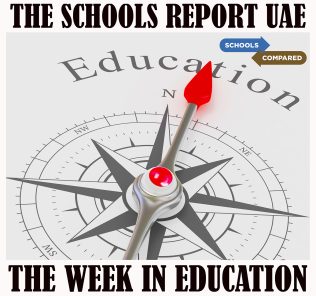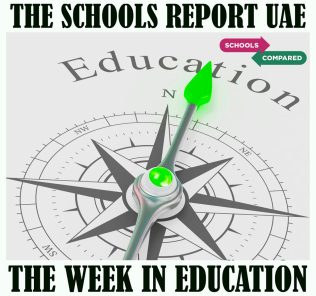SCHOOLS REPORT UAE: WHAT MADE THE NEWS FOR SCHOOLS, PARENTS AND STUDENTS IN EDUCATION THIS WEEK?
The Schools Report brings you the SchoolsCompared.com official Weekly Briefing on the Hottest News in Education.
Every Friday we bring you the latest stories in education in the UAE and around the world in the last 7 days. Here’s what’s been happening this week…
This Week in Education. UAE Education News. First. Every Friday. Only from SchoolsCompared.com.
Abu Dhabi students to return to the classroom next week
ADEK and the Abu Dhabi Emergency, Crisis and Disasters Committee has approved the gradual return to in-classroom learning for students at public schools and private schools, universities, colleges and training institutes in the emirate, as of Monday, 24 January, 2022.
Pupils will return in phases based on school year, with the first cohort of primary school children and final-year students, as well as those studying for exams, returning in-person learning from Monday January 24, and the remaining second wave of students returning from. Monday January 31.
In a twist, however, ADEK has insisted that:
“Distance learning is to remain optional for those who choose it.”
New UAE weekend: Nurseries remain open all day on Fridays to help working parents
The majority of nurseries in Dubai remain operational for full days on Fridays to accommodate children whose parents are working at different hours in the public and private sector. As part of the UAE’s 4.5-day workweek, schools and public sector entities have been operating for a half day on Fridays, while most private firms announced a weekend shift to Saturday-Sunday, but have kept Fridays as a full working day. This has left parents working in private-sector companies with a childcare-conundrum for the afternoon when schools are closed.
Enter nurseries, which are not currently affected by the same requirement to close by midday on Fridays that schools are. May Zalat, Center Director at Blossom Nursery – Mudon Branch, told Khaleej Times that the nursery is open 8am to 5pm throughout the week to accommodate families with different schedules. Parents are given the flexibility to pick up their children after Friday prayers.
“Since we are aware that working hours on Fridays are different in the government and private sectors, we want to cater to all families by providing daycare for their children.”
She added, “Parents working half day on Fridays are given the option to pick up their kids after their office hours and Friday prayers, while those in the private sector with full working days can keep their children until late afternoon.”
PCR or go home: UAE school kids must have COVID PCR test every two weeks to stay in classroom
UAE school children must have a COVID PCR test every two weeks to stay in the classroom, according to the latest protocols announced by the UAE Government.
The phased return of in-class learning in the UAE over two weeks was announced by Hazza Al Mansouri, Official Spokesman of the UAE’s Education Sector, at the UAE Government media briefing on 19 January. The first cohort of students – which includes all primary-school-age kids, as well as year 12 and 13 students and those preparing for high-stakes exams – will return to face-to-face learning on Monday 24 January. These will then be joined by the remaining students the following week, on Monday 31 January.
However, all students and staff will only be allowed to return to the classroom if they can show proof of negative PCR test results taken within 96 hours before the return to school. They will also be required to undergo PCR tests every 14 days in order to remain in the classroom. Any parent wishing to enter school premises will require the same. Read more on SchoolsCompared.com.
Drop personal statements on university applications, says social mobility expert
Personal statements on university applications are barometers of middle-class privilege and should be dropped, a leading social mobility expert has said.
Lee Elliot Major, Britain’s first professor of social mobility, said that a “huge industry of advisers” was helping more affluent teenagers with their statements. He said that the 47-line piece of writing was not fit for purpose in admissions.
The head of UCAS, the admissions service, has already suggested that the format should be overhauled.
Elliot Major, an Exeter University academic who advises the government on education and social mobility, said:
“There is growing scepticism of their [personal statements’] educational worth among admissions professionals in universities and the statements have become a systematic disadvantage to poorer students.”
He believes they should be abandoned or replaced with a set of specific questions. In addition, universities should publish clear criteria of what they want from candidates, he suggests.
The 4,000-character personal statement gives candidates the chance to sell themselves to admissions tutors by conveying their suitability for their chosen course.
He added: “Studies of personal statements have revealed a chasm in quality and style between independent and state school applicants. Independent school applicants were more likely to have well-written statements, with fewer grammatical errors, while state school pupils struggled to draw on suitable work and life experiences. The time has come to ask fundamental questions about their educational worth and the unfairness they create.
“It is increasingly clear they are more a reflection of how much support candidates benefit from rather than genuinely indicating an individual’s passion for their subject.”
Drop personal statements on university applications, social mobility expert says | News | The Times
UAE sports clubs enjoy boost as parents seek to keep distance-learning children active
Sports clubs in the UAE are enjoying a surge in enrolments, as parents seek to keep their children active amid a return to online education.
Distance learning has been in place until January 21 at government schools and universities in the UAE. In Abu Dhabi, private schools also switched to remote learning until then.
While Dubai schools are providing in-person lessons, some are also running online lessons. Even for those Dubai schools offering in-person teaching, PE lessons are currently suspended as part of Covid-19 safety measures.
Sebastian Bates, head of Warrior Academy, a martial arts academy in Dubai for children aged 4 and upwards, said close to 200 children enrolled at the academy this month. “We noticed whenever pupils are studying at home, we tend to see a huge uptake of parents interested in their children meeting up with other children and being part of a community,” Mr Bates said.
“I would say, we got about 20 per cent increase in students on both parents looking to enrol their children into our programme.”
Chris Brown, managing director of CBF performance education management, which runs Rangers Soccer Academy in Abu Dhabi in partnership with the Scottish football club, said a large number of children have signed up this month.
He said parents were coming in as they wanted their children to exercise and get out of the house.
“We have seen an 18 per cent increase on new children joining the academy this term from last term,” said Mr Brown.
“I think that there’s maybe a frustration where children are not able to play sports at school, while they’re able to go to the shopping mall, or to go to different other activities,” Mr Brown said.
The UAE educator using TikTok to teach the world the Emirati dialect
Hanan Al Fardan considers it her mission in life to spread the Emirati dialect — a unique vein of the Arabic vernacular used by the people of the UAE. Forever passionate about education, the 35-year-old first found her calling when she was working as an education sector regulator in Dubai. “I had colleagues from many different nationalities and they would often ask me how to say things in Arabic. One day, a colleague who hailed from Scotland said there were many people like her who wanted to become fluent in spoken Arabic, but simply could not find an easy way to learn,” Al Fardan, 35, told Gulf News.
“This got me thinking. Indeed, there were a number of language-teaching institutes that taught formal Arabic speech and writing. But Emirati Arabic is itself distinct and I couldn’t find any place that specifically helped people learn it.”
Even for Arabic speakers, or expats versed in modern, standard Arabic speech and writing, the Emirati dialect can prove to be somewhat unusual. For one, the phraseology is different.
“We also switch certain sounds when we speak. For instance, we change the ‘k’ sound to ‘ch’ or a soft ‘j’ in certain words. We also switch the ‘j’ sound to ‘y’ in other words,” Al Fardan explained.
11 years ago, she launched a YouTube channel — Emirati Arabic — to promote her native dialect. At first, the videos were basic and used Powerpoint presentations with audio. Then, with some mentorship, Al Fardan started adding additional elements.
Two years into this journey, she launched an institute that specialised in teaching Emirati Arabic, the Al Ramsa Institute in Dubai, together with another Emirati — Abdula Al Kaabi:
“We started with eight students, now we see about 80 students enrolled every month across a number of levels.”
And, with more than 340,000 followers on her TikTok page, and another 72,500 subscribers on YouTube, it’s fair to say that Al Fardan’s videos have been teaching Emirati Arabic to the world. Read more.
Why are ministers obsessed with teaching children to read using phonics?
The teaching of reading is now dominated by phonics, or more accurately “synthetic phonics”, where the focus is on teaching children the connection between phonemes (sounds) and letters, writes Alice Bradbury, professor of sociology of education, University College London, in The Guardian.
This teaching of the alphabetic code has always been part of learning to read, but new research suggests it now dominates, to the total exclusion of a more balanced approach involving reading whole texts and understanding the meaning of words.
The study by Bradbury and her colleagues shows that there is no solid evidence behind this method, and its ‘nonsense words’ are counterproductive.
“Our review of systematic reviews (that combine evidence from multiple studies) and of robust longitudinal experimental trials, published in 55 research papers, concluded that contextualised teaching of reading is the most effective way for children to learn.
This involves combining phonics with reading whole texts, and focusing on understanding words and sentences. […] Data from international assessment tests suggest that teaching reading in England may have been less successful since the adoption of the synthetic phonics approach.”
Read more of Bradbury’s opinion here.
School mathematics, Arabic and music classes to feature anti-bullying messages in UAE
Teachers will soon be including anti-bullying messages in their lessons as the Ministry of Education has called on educators to stamp out verbal abuse among children.
Officials instructed schools to select teachers across five subjects – mathematics, health sciences, Arabic language, moral education and music – who would then incorporate the message into their lessons.
The aim is for children to learn that verbal bullying is unacceptable, through examples provided by the teacher of each subject.
For example, a teacher of Arabic might ask pupils to write a story about a child being bullied, or a health sciences teacher could ask children to cut a heart out of red paper, crumple it up, and then see whether it could ever return to being perfectly flat.
The multi-dimensional approach will ensure children understand not only that verbally bullying is wrong, but also why it is wrong.
The decision comes after the Ministry of Education prepared a guidebook on the topic and distributed it to schools across the UAE. It aims to promote positive behaviour among children and provide teachers with examples for activities they can use to help schoolchildren understand verbal bullying and how it affects others emotionally.
Pupils told verbal abuse is unacceptable in new anti-bullying campaign (thenationalnews.com)
UK Universities could be penalised if fewer than 60% of graduates go on to study in ‘skilled employment’
Tens of thousands of students in England are studying for degrees at institutions that could soon be punished for low quality and poor value for money, under plans drawn up by the country’s higher education regulator.
The Office for Students (OfS) has published a consultation detailing its minimum acceptable outcomes for students, which sets thresholds for drop-out rates, course completion and graduate employment that universities and colleges will have to pass to avoid further investigation.
The consultation document from the OfS says that more than 60,000 students on full-time undergraduate courses are currently or recently enrolled at institutions in England that could fail to meet its minimum standards, as have more than 150,000 part-time undergraduates.
The new regulations would mean that universities, colleges and other providers are likely to be sanctioned if fewer than 80% of students studying full-time for their first degree continue past their first year, or if fewer than 75% complete their degree, over the previous four years.
Institutions could also be investigated and penalised by the OfS if fewer than 60% of their graduates go on to work in what it classifies as skilled employment.
How to study for I/GCSEs and A Levels online

Asian Teenage girl wearing earphones sitting in front of lapttop, attending online video classroom with teacher in her bedroom
Online schooling is certainly not the right fit for every child – and there are challenges and obstacles that come with online schooling. However, online schools are a good choice for some. It may be that homeschooling is a lifestyle choice, you are living overseas, your child has SEN or medical needs, they are a victim of bullying, or you simply prefer the alternative to what your own school is offering.
Having experienced online learning during the Covid-19 pandemic, families worldwide have the choice of returning to learning as normal or, instead, considering an online school as a long-term option for their child. The number of online secondary schools is growing, the quality of online education is improving, and the delivery of I/GCSE and A Level courses is changing.
Founded in 2020 during the pandemic, Minerva’s Virtual Academy is among those looking to attract a new generation of online learners. With annual fees of AED 32,300 for students studying nine subjects at IGCSE, MVA offers a significantly more affordable alternative to an equivalent private school education in the UAE.
There’s no one-size-fits-all solution to the question of educating young people, and the Academy sees itself as “a refuge” for those students for whom physical school has not worked.
Read more: Minerva’s Virtual Academy – New School First Review Exclusive 2022
© SchoolsCompared.com. 2022. All rights reserved.















































































Leave a Response